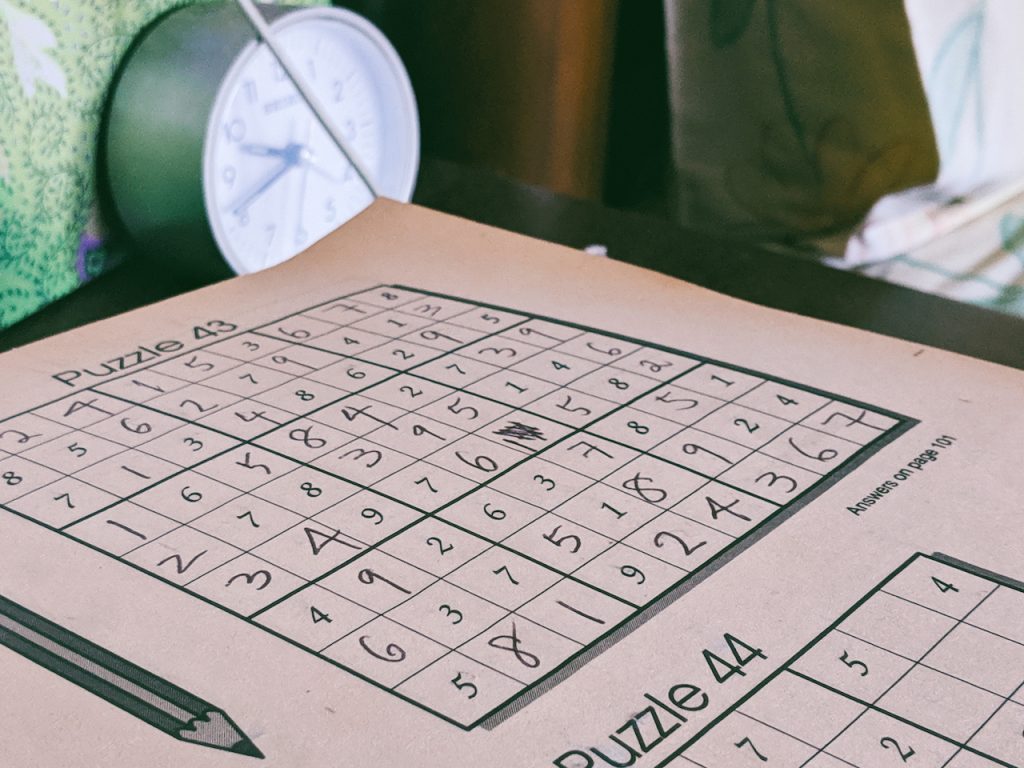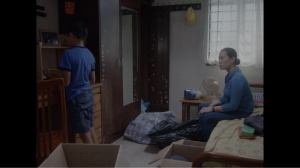A visiting professor at the National University of Singapore’s Residential College 4 this summer, Helmer Aslaksen, from the University of Oslo, Norway, used to teach full-time in the NUS math department, but now shuttles between Norway and NUS every year.
We are talking about the allure behind Sudoku—the logic-based, combinatorial number-placement puzzle.
30 minutes into our conversation, he says, “Part of the problem with math is that people tend to have all this emotional baggage. They come up with stupid reasons like girls can’t do math, Indians can’t do math, and so on. But with Sudoku, nobody says, ‘Oh, I’m not good at Sudoku because I belong to Group X.’”
Click.
There it is. There’s the anecdote.
In my notebook, I scribble, “MATH PTSD!!!” and circle it thrice.
Driven by my long-time obsession with Sudoku—which has made it the only thing to do with numbers that I remotely enjoy—I had emailed the math professor about what makes the puzzle unusually popular. After all, if there’s anyone who understands the remarkably banal objective of the game (“fill a 9×9 grid with digits, so that each column, each row, and each of the 3×3 subgrids that compose the grid contain all of the digits from 1 to 9”), it would be the professor who used to give public lectures on Sudoku.
I never expected to be sitting across him a few weeks later, being entertained with the cultural impact of a math puzzle.
Every adult who considers themselves artistically inclined still harbours some degree of Math PTSD—a ‘disorder’ acquired from years of internalising that they were ‘too stupid’ to grasp the basic concepts of probability, understand differentiation and integration, or calculate relative velocity when they were in school.
To be clear, we are not trying to diminish the actual severity of PTSD. But if, while reading the previous paragraph, you experienced a sudden urge to close this article because you found yourself feeling inexplicably defensive, you’re one of these sufferers.
Guess what, you’re not alone.

However, to understand why the popular puzzle doesn’t appear to spark similar feelings of discomfort toward math, I have to first understand the circumstances under which said feelings manifest, long after one has left school.
Take my friend, Clara, for instance.
She studied at one of the top JCs, has a rewarding writing career, and turns 30 this year. But she still feels a sense of overwhelming dread whenever she comes to the end of a meal with friends, and the table needs to split the bill.
The slip of paper invariably dredges up memories of flunking math in JC, despite having scored well for the subject during secondary school. Figuring out how much each person pays usually requires mental sums, causing her brain to shut down. (Knowing she can use a phone calculator doesn’t help ‘ease the trauma’.)
Another sufferer/survivor of Math PTSD, Cheryl, tells me her inferiority complex stems from being forced to drop Additional Mathematics in secondary school. This feeling persists, even though she graduated from secondary school 13 years ago.
“Whenever I see my math teacher on Facebook, I still feel fear and even humiliation. I also dread doing budgeting at work [so much] that I keep putting off the task. And in my personal life, I’ve been fined countless times for late payments of credit card bills,” she admits.
Finally, 26-year-old Anne is no stranger to feeling stupid because her strengths didn’t lie with math or science. She recalls being made to “stay back” in primary two because she didn’t know how to use the abacus. When she was barely eight, she already felt “very useless”.
In secondary school, Anne was allocated to what was often perceived to be the “last class” (i.e. a combined science class) because she didn’t excel at math or science, even though she had a “good overall ranking”. This class placement made students like her who didn’t excel in either subject believe their non-math and science accomplishments were comparatively insignificant.
Later on, in her university’s scholars programme, Anne took a compulsory module on quantitative statistics. The lecturer assumed everyone possessed knowledge of JC H2 math, but coming from a polytechnic course that was largely unrelated to math meant the last time she’d dealt with math was in secondary school.
“I was super stressed so I asked him for help, but he asked me to borrow a math textbook from the library. I think I only understood 1% of the practice paper prior to the exam. I totally broke down the day before the exam,” she shares.
As a result, she developed an aversion to statistics, and also quit her scholars programme eventually.
If my friends’ answers tell me anything, the ‘collective trauma’ of Math PTSD among the artistically-inclined is an all-consuming school experience whose residual effects end up shaping who we become as adults.
Some of the artistically-inclined eventually learn to embrace the chip on their shoulder. As the standard inside joke goes, “Why you do art/dance/music/media/theatre ah? Because cannot do math, is it?”
But for many others, merely talking about Sudoku’s popularity with me unwittingly reopens old wounds of having their intelligence measured against their math scores, even if it appears the puzzle itself doesn’t seem to be associated with the same vein of discrimination.

“There is virtually perfect gender balance, ethnic balance, and age distribution,” shares Professor Aslaksen.
“In general, girls tend to do better at these competitions, because they’re neater, more organised, and more structured than guys. It’s obvious that the girls do not feel any social stigma.”
Apparently, this representation and lack of gender discrimination is rare for STEM-related activities. In contrast, when he was on the organising committee for the Singapore Math Olympiad, getting girls to represent Singapore in the International Math Olympiad was a problem. (Sign-ups for the international competition are voluntary.)
For one, being associated with the math olympiad was akin to social suicide.
Secondly, there seemed to be a strong gender bias against girls pursuing math, even if it was unintentional.
The professor expounds on the latter point. He used to be on the judging panel for the National Science Challenge, where he noticed most of the girls in the competition came from girls’ schools. In comparison, it appeared girls from co-ed schools didn’t pursue math or science as “aggressively or enthusiastically” as their peers from single-sex schools.
Perhaps, he surmises, math and science just wasn’t ‘promoted’ as well to girls within co-ed schools. Or else, the existing gender bias might have become a self-fulfilling prophecy—ie. girls don’t pursue math because they don’t believe they are encouraged to pursue math.
Like he says, however, this “emotional baggage” associated with math isn’t prevalent among the Sudoku community.

“One, it somehow gives you the feeling that you understand something that ‘smart’ people of the world, regardless of race, religion, gender, or class can understand. There is a kick,” he explains.
“And two, it’s the joy of problem solving. That’s something that Singapore schools don’t tend to do very well. Math can sometimes become all about doing drills, where after doing something 10 times, you do it 10 more times. With Sudoku, however, you gradually develop your own techniques. There’s a satisfaction that most people don’t get from the usual math problems.”
Professor Aslaksen has a point, but these reasons could apply to other puzzles too. Perhaps what makes Sudoku special is the combination of convenience—I’ve seen aunties tap away on their phones trying to solve Sudoku puzzles as they alight from public transport—and ‘low barrier to entry’. There is no basic math foundation needed to attempt, and successfully complete, a Sudoku puzzle.
Essentially, Sudoku allows those who always felt demoralised by math to feel like a mathematician. It is a chance to rewrite our ‘trauma’ after struggling in an education system that measured success according to our prowess for subjects we simply couldn’t understand.
Still, the popular puzzle is just one ‘solution’, if at all, to the bigger problem: a society that sees math and science as more ‘valuable’ than the humanities.

It doesn’t help that, as Professor Aslaksen says, our government is packed with politicians who boast a background in STEM, which is “absolutely unique”. In this sense, we don’t have to deal with deep-seated scientific illiteracy or ignorance, such as climate change denial.
He adds that Singapore is a “math and science utopia” or “mathocracy”. In this country, people don’t ask what they can become if they study math. Rather, they ask whether they can become anything if they don’t study math.
The problem, however, comes when math and science are consistently and explicitly pitched against the humanities throughout our education. We believe that people who are good at math and science don’t or shouldn’t typically enjoy literature or traditional culture, and vice versa.
This uncomfortable dichotomy is reinforced through arts and science streams in JC, where the science streams are presumed to be ‘smarter’, as indicated by their lower cut-off points. But this resulting false hierarchy also exists because we lack a culture where knowledge is fundamentally pursued for pleasure. Systemic pragmatism resonates at the individual level too: we study to get good grades to get a good job, and not because we find joy in learning.
As a result, with subjects like math that are ‘black and white’, it can be easy to fall into the trap of rote memorisation and repeatedly practising formulaic exam questions solely to score well.
Call it a pipe dream, but I don’t believe the dichotomy between the humanities and sciences has to exist; there must be a way to marry the two, so that it doesn’t inherently exclude those who are artistically-inclined or right-brained.
As far as Professor Aslaksen is concerned, there is. This seemingly novel marriage of math and art is, in fact, the basis for most of his modules. For instance, this summer, he’s teaching a module titled Heavenly Mathematics and Cultural Astronomy. He’s also given public lectures on how the date of Qingming Festival is derived and why the Singapore flag isn’t astronomically accurate.
Ultimately, as he asserts, this harmony is also present in a Sudoku puzzle. Those with Math PTSD are able to reconcile their disdain for the subject through being introduced to it again via an utterly satisfying, albeit simple, game of Sudoku.
“Math isn’t characterised by what we study, but how we study. For example, while a biologist studies biology, a mathematician can really study anything. What makes it math is the way we study the subject; the way we approach it,” he explains.

The walks of shame to the finance office were reminiscent of the acute shame I’d feel from being the only person in class who got a supposedly easy math question wrong. In turn, I’d get even more demoralised to try harder, beginning the self-perpetuating cycle.
Unfortunately, some judgements stay with us for life, even if we know on an intellectual level that they shouldn’t matter anymore when we’re pushing 30.
When I first pitched this idea, it was just meant to be a lighthearted ode to Sudoku—the puzzle I’ve been hopelessly obsessed with since stumbling upon it online years ago. I wanted to write about how this nerdy hobby seems to transcend math ability; I wanted to know if other Sudoku enthusiasts felt the same exhilarating rush as they watch the final numbers materialise after spending hours pencilling and erasing their ‘workings’ on an exceptionally tough game.
Instead, I found myself confronting the bitter reminder that a subject I’ve always wanted to master has always shredded my self-confidence—and that my relationship with math is intrinsically tied to my relationship with Sudoku.
Even though I eventually learnt to enjoy math after years of an uphill battle fraught with tuition, Sudoku has been crucial to helping me overcome Math PTSD.
All my life, math has never felt good nor right. But when I begin a game of Sudoku excitedly, and when I realise my younger self would never have expected numbers to be therapeutic and not traumatic, it feels perfect.
In the few seconds following a single critical number placement, the remaining numbers fall into place and I finally—finally—feel smart enough.






